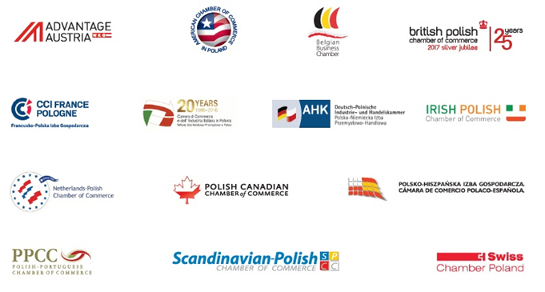Economic Survey 2018: Poland in the eyes of foreign investors
According to foreign investors, Poland’s competitive advantage lies in the EU membership, quality of staff, availability of local subcontractors and increasingly better infrastructure. Unfortunately, foreign companies operating in Poland see a decrease in the availability of qualified employees. 90% of investors, however, claim that they would invest in Poland again. It’s a high percentage, but 5.5 pp lower than last year. In this year’s European investment attractiveness ranking, Poland is second after Czech Republic – these are the results of the 13th edition of the Economic Survey carried by the German-Polish Chamber of Commerce in cooperation with thirteen other bilateral chambers in Poland, the Scandinavian-Polish Chamber of Commerce among them, associated in the International Group of Chambers of Commerce. 300 foreign companies operating in Poland took part in the survey, and approx. 1700 in Europe in total.
3 x HR
The survey was based on a total of 21 investment attractiveness factors. Similarly to last year, the EU membership and employees’ qualifications are the highest-rated factors according to foreign companies operating in Poland. The adequacy of higher education was ranked third, and the employees’ productivity and motivation – fourth. The quality and availability of local subcontractors and the quality of infrastructure are also seen by the investors as Poland competitive advantages.
Decrease in availability of employees, increase in adequacy of vocational education
Conditions for research and development, access to state and EU funding, and labour costs (all these factors score approx. 3 out of 5 possible points) can be found in the middle part of the ranking. However, the companies indicate a decrease in availability of qualified employees (5 points down in the attractive-ness factors ranking) and a pressure on remuneration. The respondents, on average, predict a 6.2% growth of salaries in 2018. The evaluation of the ade-quacy of vocational training has a better rank this year (up by 6 positions, to 2.88 points out of 5 possible), as well as the flexibility of working hours (up by 4 positions, to 2.84 points).
Worst evaluation for political and social stability and predictability of economic policies
Similarly to 2016 and 2017, the lowest-scoring factors in 2018 are the political and social stability as well as the predictability of economic policies in Poland. Both of them score approx. 2.4 points out of 5 possible.
Good current economy condition and good perspectives for 2018
A vast majority of the 2018 Economic Survey respondents see the current con-dition of the Polish economy in a positive light. A half (50.0%) assessed it as satisfactory, 46.6% as good, and only 3.6% expressed a negative opinion.
In the opinion of one third of respondents (33.8%), the prospects for the Polish economy in 2018 are better than last year. Over a half of companies (54.4%) think they remain unchanged.
Companies optimistic about their situation
The entrepreneurs surveyed this year have an optimistic view on their com-pany’s situation. 64.3% claim it’s good, and 32.5 see it as satisfactory. The ma-jority of respondents (56.6%) predict that the situation will be better this year. 46.7% foresee an increase in turnover, 45.4% - an increase in employment, and 36.7 – an increase in investment expenditure in 2018.
Poland second in the European ranking
For 300 foreign companies operating in Poland that participated in the survey, Poland is the regional leader in Central and Eastern Europe when it comes to investment attractiveness. According to 1700 entrepreneurs from 20 European countries that took part in this year’s edition of the survey, Poland holds the second place, behind Czech Republic, and it has been like this since 2016, for three years in a row.
Estonia goes up to third place (from fourth last year), ahead of Slovakia (third last year). The differences between the countries as regards the number of points are tiny, just fractions of a point. In 2018, Czechia scored 4.11 out of 6 possible points, Poland scored 3.99 points, Estonia 3.98 points, and Slovakia almost 3.98 points (nearly as many as Estonia)
About the survey
The survey respondents evaluate the Central and Eastern European countries, including Poland, on the basis of 21 investment attractiveness factors (on a scale from 1 to 5 points) and assess directly the CEE economies (on a scale from 1 to 6). They also comment on the current condition of the economy, as well as on the situation of their companies and the prospects for development.
The Economic Survey was conducted in February and March 2018 by the German-Polish Chamber of Industry and Commerce in cooperation with thirteen other bilateral chambers in Poland, operating within the International Group of Chambers of Commerce: American, Austrian, Belgian, British, Canadian, Dutch, French, Irish, Italian, Portuguese, Scandinavian, Spanish and Swiss. 300 foreign capital companies operating in Poland and approx. 1400 investors in more than a dozen other European countries participated in the 13th edition of the survey, which gives the total number of approx. 1700 respondents.
In the “Polish sample” of 300 companies, 198 foreign investors come from Germany, 20 from the USA, 14 from France, 14 from Switzerland, 7 from Austria, 5 from Sweden, 4 from Spain. The rest of respondents were investors from Canada, Finland, Denmark, Italy, the Netherlands, Norway, Ireland, Portugal, among others. The survey was conducted at the same time by German bilateral chambers of commerce in the world (AHK = Auslandshandelskammern) in: Po-land, Czechia, Slovakia, Slovenia, Estonia, Lithuania, Latvia, Croatia, Romania, Bulgaria, Hungary, Serbia, Macedonia, Ukraine, Belarus, Montenegro, Bosnia and Hercegovina, Macedonia, Kosovo and Albania.
Presentation to be downloaded: Economic Survey 2018: Poland in the eyes of foreign investors




 EUR 4.3225 zł
EUR 4.3225 zł USD 4.0245 zł
USD 4.0245 zł DKK 0.5796 zł
DKK 0.5796 zł SEK 0.3703 zł
SEK 0.3703 zł NOK 0.3669 zł
NOK 0.3669 zł